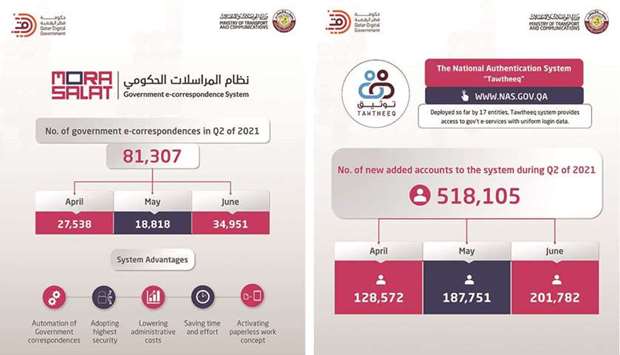The Government e-Correspondence System (Morasalat) recorded more than 81,000 e-correspondences during the second quarter of 2021, the Ministry of Transport and Communications (MoTC) has said.
A total of 81,307 e-correspondences were carried out by various departments during the period. Morasalat was introduced by MoTC as one of the initiatives to improve communication among government entities and institutions in Qatar.
According to a MoTC tweet, April marked 27,538 e-correspondences, followed by 18,818 and 34,951 in May and June, respectively.
Morasalat is being implemented by the ministries and government institutions as a pioneering model for using digital technology to maximise the benefit of the information network, and a platform for the exchange of data online among them within the framework of the Qatar National Vision 2030.
It provides automation of correspondences among the government entities by abiding by the highest standards of security. The benefits of Morasalat are manifested in saving time and effort and reducing administrative costs, while conforming to the “paperless organisation” concept.
Thawtheeq records increase in
the number of new accounts
As many as 518,105 new accounts were added to the National Authentication System, ‘Tawtheeq’ during the second quarter of 2021, marking an increase of more than 91,000 accounts compared to the first quarter. A total of 426,537 new accounts were added in the first quarter.
In April, a total of 128,572 accounts were created, followed by 187,751 and 201,782 in May and June, respectively. MoTC launched Tawtheeq while targeting the management and governance of the digital identity of individuals and businesses that use websites and online applications to access government e-services.
Tawtheeq provides multiple methods for unified access to the e-services and offers numerous advantages to both digital service providers and users. These include user online registration, user verification, unified access using the same username and password to all government e-services and multilayered verification.
The system also provides various means of access by either using a username and password with multi factor authentication or a smart ID card, in addition to the digital-signature service, which enables users to sign their government transactions. A unique feature is that the system simplifies the process of connecting government entities with the service via standard protocols. It features faster user access to all government services and boosts user information security in line with the Qatar Digital Government 2020 Strategy, which, as its first strategic objective, aims to better serve individuals and businesses by emphasising the customer focus through serving the people who live and work in Qatar, and businesses that fuel the nation’s economic growth.
Tawtheeq, a digital identity verification function, provides safe authentication consistent with world best practices in information security. It also offers appropriate solutions to constraints that government entities face while developing their digital services such as the difficulty of verifying user credibility online during electronic transactions and the vulnerability of digital identities to theft or hacking.


